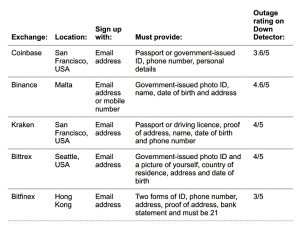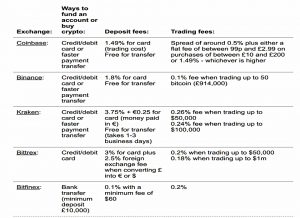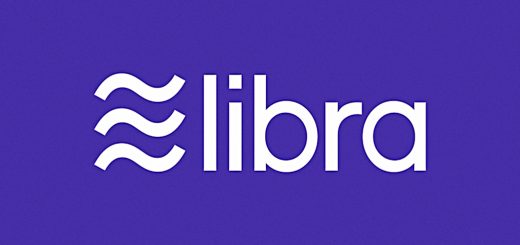Buying Bitcoin in the UK – Part 2

Today’s post is a second visit to the process of buying bitcoin in the UK.
The Story So Far
- Interest in Bitcoin is at an all-time high, as is the BTC price itself ($35K as I write this).
- There has also been a lot more positive sentiment from institutional investors recently.
- So long-term DIY investors might want a small permanent allocation (say 1%) to bitcoin.
- The UK regulator (the FCA) recently (January 2021) banned the sale of crypto derivatives to retail investors.
- This removed both tax-efficient ways of gaining exposure to BTC:
- ETFs (strictly, ETPs) within a SIPP
- Spread-bets
- So you’ll need to pay 20% capital gains tax on your profits.
- Unless these are below £12.3K pa (the annual CGT allowance).
- Another way to theoretically access your crypto profits without paying tax would be to take out a loan against them.
- One potential way around the FCA ban is to become a “professional” spread bettor at one brokerage.
- The key downside is that you lose the negative balance protection introduced a few years ago – retail investors can’t lose more money than they hold in their spread-betting account.
- To qualify as a professional, you need an overall portfolio worth €500K – SIPPs, ISAs and cash all count, but property and company pensions are excluded.
- You also need to place 40 trades of significant size over a year, which in turn required a spread-bet account size of around £50K to £60K.
- The process of buying and storing bitcoin has three steps:
- You open an account with a crypto broker (also known as a cryptocurrency exchange)
- You transfer fiat money (£) into the account
- You buy crypto with that £ balance (we’ll assume BTC)
- There are reports that some UK banks take a dim view of crypto transactions, so tread carefully.
- At this point you have three options:
- You can leave it with the broker – hardcore crypto HODLrs won’t do this (“not your keys, not your crypto”) but beginners may not care, especially for small balances
- You can move it into a software wallet on your phone or PC – this will have public and private keys so that people can send you money and you can access your stash
- You can move it offline into a hardware wallet (costing £50 or more to buy); this comes with a 12- to 24-word “seed phrase” which allows the wallet to (re-)generate your keys.
- The seed phrase needs to be physically stored and protected (eg. against theft and fire).
Today we’ll look at what the mainstream press and the internet bulletin boards have to say about the process.
Mainstream press
The TImes recommended Coinbase and Binance, plus the Ziglu app and the eToro platform.
- They also mentioned the Gemini exchange, founded by the Winklevoss twins of Facebook fame.
They also talked about fees, which we’ll come to below:
If you want to buy bitcoin and other cryptos – and sell them again – there’ll be several
fees, such as transaction fees, deposit fees, withdrawal fees, trading fees and escrow fees of usually a few percent of the total transaction value.
You might also need to pay FX fees, as some platforms only accept deposits in dollars (or sometimes euros).
The Times also discussed a couple of funds with Bitcoin exposure:
- Ruffer, which took a 2.5% position at the end of 2020, and
- The Invesco Global Blockchain ETF, which holds “picks and shovels” companies, rather than crypto itself.
There’s also the Grayscale Bitcoin Trust in the US, but I’m not sure whether UK investors can but this.
On Citywire, David Stevenson also reported on the Ziglu app, which apparently charges 1.25% per transaction.
He also mentioned investing via crypto sphere shares.
- KR1 was the one he wrote about, but other UK-listed companies include ARB, MODE, TRD and COIN.
This might allow you to get tax-sheltered crypto exposure within your SIPP or ISA, but they are not pure plays.
MODE has an app (like Ziglu), but it’s only available for Apple devices at the moment.
This is Money mentioned a number of exchanges and brokers:
- eToro
- Coinbase
- Binance
- Kraken
- Bittrex
- Bitfinex
- Revolut
The article notes that although crypto enthusiasts often stress the anonymity of the blockchain, most reputable brokers will need to follow a know-your-customer (KYC) process as part of onboarding – which means that your identity will need to be confirmed.
Blogs
I looked around for interesting blog (and Medium) posts on buying Bitcoin, but there were vanishingly few that were focused on the UK and none which looked at the impact of the FCA ban on crypto derivatives for retail investors.
- There was a lot of general information available and lots of discussion on the prospects for bitcoin and the other derivatives.
But there was nothing that we haven’t already covered in this series of articles to date.
I’m not a fan of social media in general and only use two platforms regularly – Twitter and Reddit.
- Both have gone dramatically downhill in recent years but they remain useful.
What they have in common is the ability to filter what you see – with a little work. you can arrange your consumption so that no-one has paid to put stuff in front of you.
- You can also obtain 90% of the benefits whilst lurking (staying in read-only mode, without contributing directly.
When you contribute, you run the risk of wasting your time on unwinnable internet arguments. (( I actually do post to both platforms, but much less than I did a couple of years ago ))
Twitter is essentially a new service, with links to longer articles, whereas Reddit follows a question and answer (or increasingly, a brag and insult) format.
- So I had a quick look at Reddit’s advice for bitcoin beginners.
Note that Reddit is dominated my young American men, most of whom have great self-confidence though possibly less knowledge and experience than they imagine.
- But since that’s a pretty similar demographic to bitcoin, there could be some useful stuff there.
Reddit had good things to say about Binance, Coinbase (Pro), Gemini and Revolut.
- Kraken was also good, but slow to validate ID.
- Bison, a German exchange, also came up.
Coinbase was sometimes seen as cheaper than Binance, sometimes more expensive – this needs further investigation.
Santander, Nationwide and Co-op were mentioned as banks that were accepting crypto transactions, and HSBC as one that wasn’t.
- Of the new fintech banks, Revolut and Monzo were recommended and Starling is known to not accept crypto transactions.
Using limit orders to get good rates on crypto was also recommended.
Hardware wallets under discussion included Ledger and Trezor.
- Trezor allows you to buy crypto directly, without an exchange – I’ll need to investigate the fees here, but I believe they are high.
Blockstream Green was mentioned as a software wallet when you have less than $1K of crypto.
I also discovered that the standard for seed phrases is known as BIP39.
- Hardware wallets seem to have a passphrase security system (in addition to a PIN for the physical device).
So the passphrase will need to be stored safely as well, and separately from the seed.
It was also recommended to keep a decoy hardware wallet with no passphrase, on which you store only a fraction of your BTC.
- This is your “gun to your head” giveaway wallet.
Fees
The chart below comes from the This is Money article.
Here’s what we know so far:
Per deposit:
- Coinbase, Binance, Kraken = free (bank transfer)
- Bitfinex = 0.1% (transfer) with $60 minimum (= $60K transaction size)
- Bittrex = 3% (card) plus 2.5% (FX) = 5.5% (!)
Per transaction:
- Ziglu = 1.25%
- Coinbase = 1.49%
- Binance = 0.1%
- Kraken = 0.26%
- Bittrex, Bitfinex = 0.2%
Price spread:
- Coinbase = 0.5%
I think I’ll need to put a table together at popular transaction sizes (say £100, £250, £500, £1000, £5000).
Conclusions
We now have quite a list of brokers, trusts and platforms to investigate in the next article:
- Coinbase
- Binance
- Gemini
- Ziglu app
- Mode app
- Cash app (Square)
- eToro
- Kraken
- Bittrex
- Bitfinex
- Bison
- Grayscale Bitcoin Trust (GBTC)
- Revolut
We’ll also look at plans from PayPal to support bitcoin transfers and balances.
- And we’ll look at the Trezor and Ledger hardware wallets.
Until next time.


















